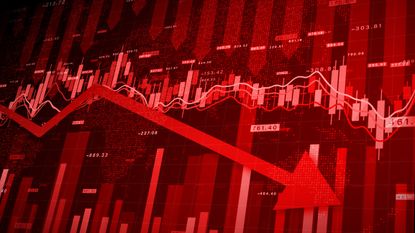The September selloff resumed Tuesday with stocks closing lower across the board. In addition to rising Treasury yields, sentiment took a hit after the latest batch of economic data came in worse than expected and as a looming government shutdown sparks concern over another potential U.S credit downgrade.
Earlier today, The Conference Board said its consumer confidence index fell to a four-month low of 103.0 in September from August’s upwardly revised 108.7 reading. Additionally, the expectations index, which measures consumers’ short-term outlook for business, wages and labor market conditions, plunged to 73.7 from 83.3 in the prior month. Readings below 80 have historically signaled a recession within the next 12 months, according to the report.
“Consumer confidence fell again in September 2023, marking two consecutive months of decline,” said Dana Peterson, chief economist at The Conference Board, in the press release. “Write-in responses showed that consumers continued to be preoccupied with rising prices in general, and for groceries and gasoline in particular.” Peterson added that the country’s political situation and higher interest rates were also concerns weighing on consumers.
Subscribe to Kiplinger’s Personal Finance Be a smarter, better informed investor.
Save up to 74%
Sign up for Kiplinger’s Free E-Newsletters Profit and prosper with the best of expert advice on investing, taxes, retirement, personal finance and more – straight to your e-mail.
Profit and prosper with the best of expert advice – straight to your e-mail.
“Food and gasoline prices aren’t the only headwinds for consumers, with lofty mortgage rates and towering housing prices in August causing new home sales to hit the lowest level since March,” says José Torres, senior economist at Interactive Brokers.
Indeed, the Census Bureau this morning said that sales of new single-family homes fell 8.7% month-over-month in August to a seasonally adjusted annual rate of 675,000. Still, new home sales were up 5.8% year-over-year.
Government shutdown puts U.S. credit rating at risk In addition to the downbeat economic data, today’s mood was soured after Moody’s late Monday warned a government shutdown would be “credit negative” for the U.S.
“In particular, it would demonstrate the significant constraints that intensifying political polarization put on fiscal policy making at a time of declining fiscal strength, driven by widening fiscal deficits and deteriorating debt affordability,” Moody’s wrote in a research note. In August, Fitch downgraded the U.S. credit rating, citing “erosion of government.”
Rivian, Fisker buck the bearish trend on bullish analyst notes Today’s selling was widespread, with all 11 S&P 500 sectors ending in negative territory. Utilities (-3.0%) were the worst performers, followed by consumer discretionary stocks, which plunged 1.8% on headwinds from Amazon.com (AMZN). The Federal Trade Commission (FTC) and 17 states on Tuesday sued the e-commerce giant, accusing it of being “monopolistic” and participating in anticompetitive behavior, including keeping prices artificially high. Amazon stock fell 4.0% in reaction.
Not all of the day’s price action was lower, though. Electric vehicle stocks Rivian Automotive (RIVN) and Fisker (FSR) both soared in today’s session. RIVN jumped 5.4% after Baird analyst Ben Kallo reiterated an Outperform (Buy) rating on the stock and named it as a “bullish Fresh Pick.” The analyst thinks third-quarter deliveries will beat expectations and that sentiment will improve as Rivian “continues to realize cost benefits from an improving supply chain and the use of in-house components.”
FSR stock, meanwhile, surged 9.6% after BofA Securities analyst John Babcock initiated coverage with a Buy rating. Fisker offers investors “pure-play exposure to the rapidly growing EV market, has key milestones coming in 2024 and a lower risk business model than peers,” Babcock wrote in a note to clients.
As for the major indexes, the rate-sensitive Nasdaq Composite closed down 1.6% at 13,063 as yields on the 2-year and 10-year Treasuries hovered near their highest levels since 2006 and 2007, respectively. The broader S&P 500 finished down 1.5% at 4,273, while the blue chip Dow Jones Industrial Average shed 1.1% to 33,618.
Related contentWhy Now Could Be a Good Time to Invest in Oil and GasKiplinger’s Weekly Earnings Calendar for This WeekHow to Find the Best Mid-Cap Stocks
